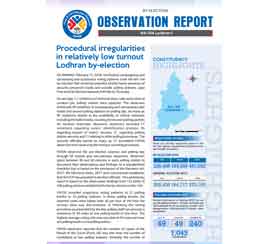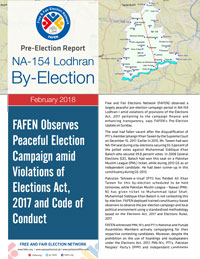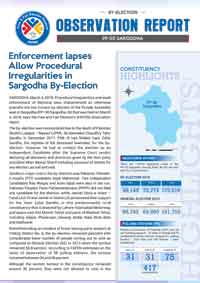ISLAMABAD, February 12, 2018: Unchecked campaigning and canvassing and suspicious voting patterns mark the NA-154 by-election that remained peaceful amidst heavy presence of security personnel inside and outside polling stations, says Free and Fair Election Network (FAFEN) on Thursday.
On average, 2.7 violations of electoral laws, rules and codes of conduct per polling station were reported. The observers witnessed 99 violations of campaigning and canvassing rules inside and around polling stations on polling day. As many as 90 violations related to the availability of critical materials including the ballot books, counting forms and sealing packets for election materials. Moreover, observers recorded 77 violations regarding voters’ identification process, 26 regarding breach of voters’ secrecy, 21 regarding polling station security and 11 relating to other polling processes. The security officials barred as many as 12 accredited FAFEN observers from observing the voting or counting processes.
FAFEN observed the pre-election process and polling day through 50 trained and non-partisan observers. Observers spent between 30 and 60 minutes in each polling station to document their observations and findings on a standardized checklist that is based on the provisions of the Elections Act, 2017, the Elections Rules, 2017 and instructional handbooks that the ECP has provided to election officials. This preliminary report is based on the observation findings from 122 (36%) of 338 polling stations established for the by-election in NA-154.
FAFEN recorded suspicious voting patterns at 21 polling booths in 19 polling stations. In these polling booths, the reported votes were higher than 45 per hour at the time the turnout data was documented. In following the voting procedure as prescribed by the law, polling staff can process a maximum of 45 votes at one polling booth in one hour. The highest average voting rate was recorded at 93 votes per hour at a polling booth in one polling station.
FAFEN observers reported that the number of copies of the Result of the Count (Form 45) was less than the number of candidates at two polling stations. Similarly, the number of copies of the Ballot Paper Account (Form 46) did not match the number of candidates at five polling stations. The ballot papers issued by the Returning Officer were less in number than the total registered voters at 79 polling stations. Moreover, four Presiding Officers reported that they did not receive the packets to be used for sealing election materials at the close of the poll.
FAFEN observers reported that the Polling Officers were not calling out the names of voters loudly during the voter identification process at 74 of 240 polling booths observed during the day. Not calling out the names of voters creates difficulties for polling agents to challenge the identity of the voters. Moreover, polling staff did not cross out the names of identified voters from the electoral roll at three polling booths where polling agents were also unable to effectively monitor the voting process.
FAFEN observers reported from 28 polling stations that the workers of several political parties had set up camps within 400 meters of the polling stations in violation of the electoral rules. Voters were seen carrying vote vouchers (parchis) with visible symbols of the contesting parties or candidates inside 16 polling booths. Similarly, in nine instances, election officials did not remove campaign materials inside and outside polling stations as required by the law. Moreover, party or candidate supporters were observed providing transport to voters outside 46 polling stations.
According to FAFEN estimates, the overall turnout of voters in this by-election is expected to be approximately 45.4 percent – 47.4 percent for men and 42.7 percent for women. The observers reported increasing number of voters turning out to cast their vote in the afternoon. However, amidst the strict security, only a couple of voters were being allowed to enter a polling station at a time while the rest were made to wait in queues outside the polling stations. The observers reported the congested arrangement of polling stations at a number of places. As many as three polling stations comprising 11 polling booths were set up in a primary school building at Basti Risala with a total of 4,178 voters assigned.
The ECP did not use the Biometric Verification Machines (BVMs) or Electronic Voting Machines (EVMs) at any of the polling station in the constituency.
To download Urdu Press Release, click here | To download complete report, click here




